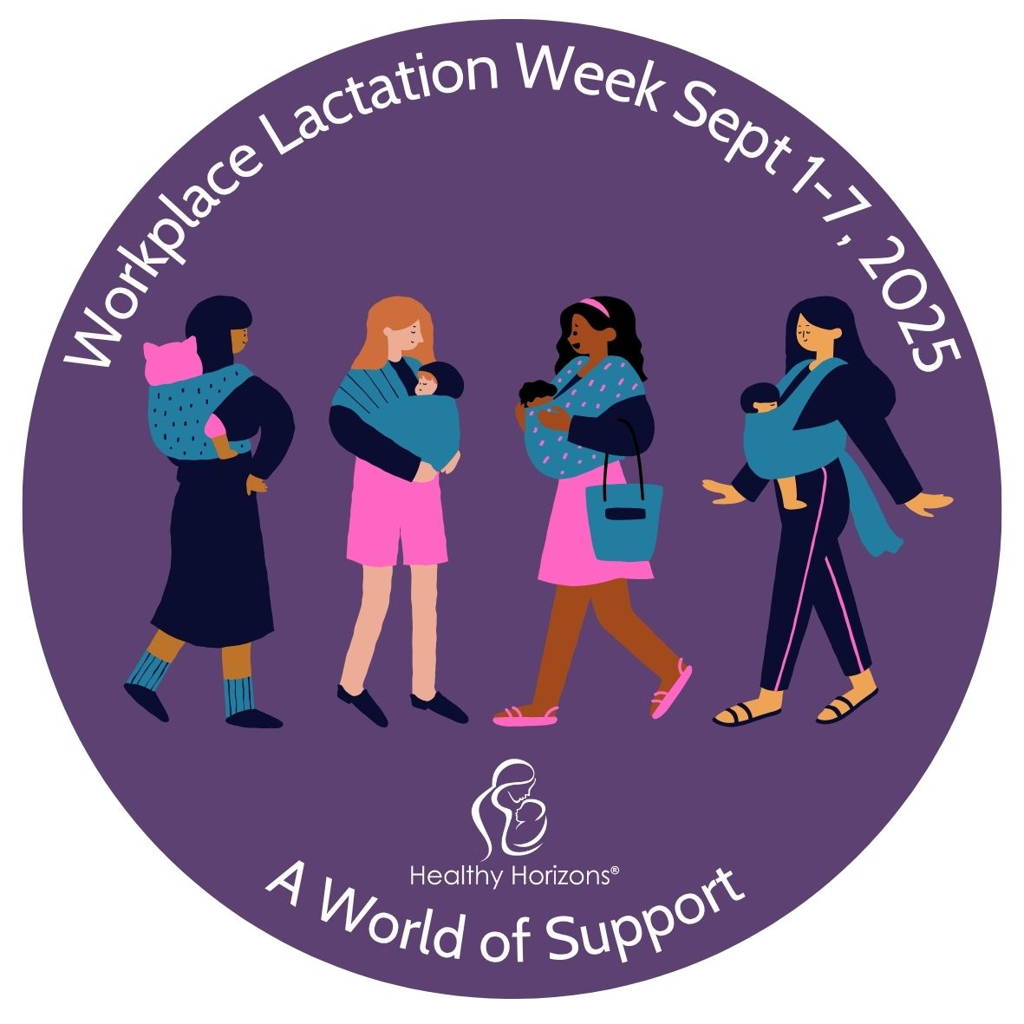No Products in the Cart

Welcome to Workplace Lactation Week™, a dedicated week celebrated along with National Breastfeeding Month. This year, we're focused on A World of Support: Creating Breastfeeding-Friendly Workplaces Everywhere. This themed week serves as an invaluable resource for leaders, parents, and businesses, providing essential information, resources, and best practices to promote a truly supportive and lactation-friendly work environment for everyone.
Planning for this important initiative began in 2022, with the first-ever Workplace Lactation Week™ celebrated September 1-7, 2023. It is celebrated annually from September 1st to September 7th to coincide with Labor Day in the United States.
The 2025 Theme: A World of Support: Creating Breastfeeding-Friendly Workplaces Everywhere
The theme for Workplace Lactation Week 2025 is "A World of Support: Creating Breastfeeding-Friendly Workplaces Everywhere." This theme emphasizes support in any work environment a parent occupies, meeting them where they are—whether they work in an office, a factory, remotely, in the field, or are traveling abroad. In the United States, a robust framework of federal, state, and local lactation laws now exists to guide organizations and truly support new parents. Key among these are the federal PUMP (Providing Urgent Maternal Protections) Act and the Pregnant Workers Fairness Act (PWFA), all aimed at enhancing support and ensuring that working and pumping parents have the necessary protections and accommodations to thrive.
Beyond the U.S., the importance of workplace lactation support is recognized globally. Many countries have implemented their own national laws and policies, often drawing inspiration from international standards such as the International Labour Organization (ILO) Maternity Protection Convention, which advocates for maternity leave, health protection, and breastfeeding breaks as part of a comprehensive approach to supporting working mothers. Our collective goal is to foster environments where all parents, regardless of their location, feel supported in their decision to continue breastfeeding after returning to work.
Workplace Lactation Week™ 2025 Events
Workplace Lactation Week™: September 1-7 Every Year
Workplace Lactation Week™ is observed annually from September 1st to September 7th. This week not only celebrates the contributions of nursing mothers and parents in the workplace but also aligns with Labor Day, highlighting the vital role working and pumping parents play in the workforce. It's a time to recognize and support the efforts of working parents who balance the responsibilities of their careers and caring for their children.
Why Workplace Lactation Support Matters
Supporting nursing mothers at work goes beyond basic compliance; it fosters a workplace culture that values employees' well-being and recognizes the critical role of chest/breastfeeding. Here's why workplace lactation support matters:
Explore Workplace Lactation Week™ Resources
Engaging Community Partners
Collaborate with Experts: Partner with workplace lactation experts, breastfeeding organizations, and government organizations to enhance your network and support parents at work.
Community Events: Join our community events, where nursing mothers, parents, leaders, and businesses can connect, share experiences, and inspire each other to support working parents.
Spread the Word:
Measuring Impact
Feedback and Surveys: Engage with participants and gather feedback to assess the effectiveness and impact of your workplace lactation support programs and readiness for new and existing legislation.
Tracking Progress: Monitor absenteeism rates, employee satisfaction, and retention data to measure the positive impact of lactation support on your organization. The “Business Case for Breastfeeding” is a great example of the positive impact supporting pumping parents has on the bottom line.
Let's Celebrate Workplace Lactation Week™ 2025 Together!
Join us during Workplace Lactation Week™ 2025 in celebrating the remarkable contributions of nursing mothers and parents in the workplace. Together, we can create a nurturing and supportive environment that empowers working parents, boosts employee well-being, and sets the stage for a thriving and positive workplace.
Curated U.S. Resources
DOL’s FAQ – Pumping Breastmilk at Work
https://www.dol.gov/agencies/whd/nursing-mothers/faq
PUMP Act (scroll to “Division KK”)
https://www.congress.gov/117/bills/hr2617/BILLS-117hr2617enr.pdf
PUMP Act Blog
HealthyHorizons.com/blogs/blog/pump-act
Department of Labor WHD poster including the PUMP Act
https://www.dol.gov/agencies/whd/posters/flsa
EEOC Guide “What You Should Know About the Pregnant Workers Fairness Act” https://www.eeoc.gov/wysk/what-you-should-know-about-pregnant-workers-fairness-act
Pregnant Workers Fairness Act (PWFA) Blog https://www.healthyhorizons.com/blogs/blog/what-employers-need-to-know-pregnant-workers-fairness-act-pwfa
Guide to Seeking Medical Certification https://pregnantatwork.org/wp-content/uploads/PWFA-Medical-Certification-Guidelines-for-Employers.pdf
Guide to Pregnancy Accommodations https://worklifelaw.org/news/pregnancy-accommodations-explained/
Transportation Worker Rights https://pregnantatwork.org/wp-content/uploads/PUMP-Transportation-Workers.pdf
Paid Lactation Break Guidance https://pregnantatwork.org/PaidLactationBreaks
Workplace Lactation Law Map https://pregnantatwork.org/workplace-lactation-laws/t/
Source Furniture For Your Lactation Rooms https://www.healthyhorizons.com/collections/lactation-room
Implement a Solution or Implement Lactation Room Servicing™
Title IX Toolkit https://thepregnantscholar.org/titleix-updates-toolkit
Curated Global Resources
The International Labour Organization (ILO) Maternity Protection Convention, 2000 (No. 183) stands as a significant international standard for supporting working parents. It's crucial to understand that this convention is legally binding only for the countries that have formally ratified it, thereby committing to integrate its provisions into their national laws and practices. As of the latest information, a considerable number of nations globally have undertaken this commitment. These include countries such as Albania, Antigua and Barbuda, Austria, Azerbaijan, Belarus, Belize, Benin, Bosnia and Herzegovina, Bulgaria, Burkina Faso, Cuba, Cyprus, Czechia, Djibouti, Dominican Republic, El Salvador, Germany, Hungary, Italy, Kazakhstan, Latvia, Lithuania, Luxembourg, Mali, Mauritius, Montenegro, Morocco, Netherlands, Niger, North Macedonia, Norway, Panama, Peru, Portugal, Republic of Moldova, Romania, San Marino, Sao Tome and Principe, Senegal, Serbia, Slovakia, Slovenia, Suriname (with entry into force on November 28, 2025), and Switzerland. For the most up-to-date and detailed information, including specific ratification dates and the current status for each country, you can directly consult the ILO's NORMLEX database, which is linked below.
Ratifications of C183 - Maternity Protection Convention, 2000 (No. 183)
https://normlex.ilo.org/dyn/nrmlx_en/f?p=1000:11300:0::NO:11300:P11300_INSTRUMENT_ID:312328
ILO Maternity Protection Convention, 2000 (No. 183)
https://normlex.ilo.org/dyn/nrmlx_en/f?p=NORMLEXPUB:12100:0::NO::P12100_ILO_CODE:C183
ILO Maternity Protection Recommendation, 2000 (No. 191)
https://normlex.ilo.org/dyn/nrmlx_en/f?p=1000:12100:::NO:12100:P12100_INSTRUMENT_ID:312529
International Labour Organization (ILO) NORMLEX Information System
WABA Explainer: Key Elements of Maternity Protection at Work
https://waba.org.my/v3/wp-content/uploads/2018/08/2-Key-Elements-of-Maternity-Protection-at-Work.pdf
Happy Workplace Lactation Week™ 2025!